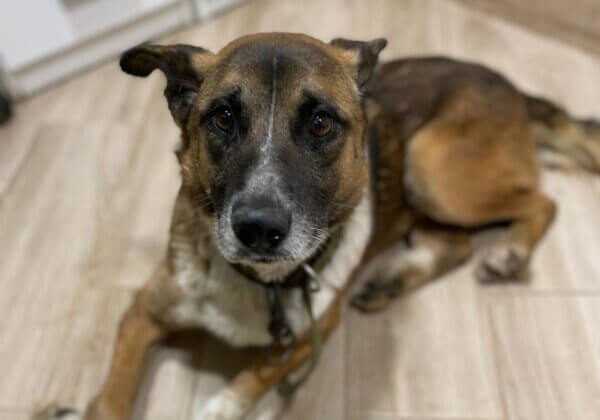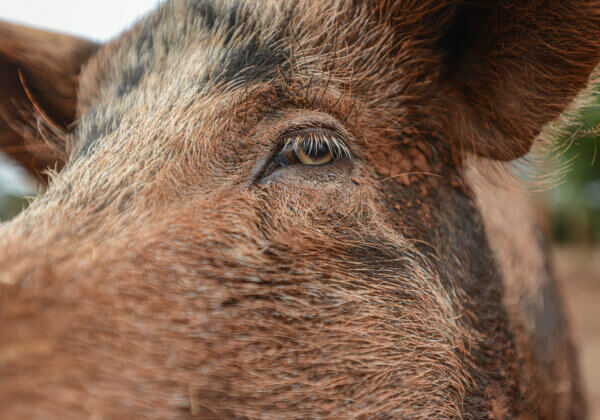Animal Rescue and Support In Flooded NSW
From Brisbane to Sydney, across the east coast, Australia is experiencing an unprecedented and fatal flooding event. Heavy rainfall across the region has resulted in first-in-a-decade flooding, which has sadly already claimed the lives of 10 humans and hundreds of other animals.
While rain has yet to ease in many areas and a heartbreaking clean-up still awaits shell-shocked residents, there have been some good news stories coming out of the disaster, too, as Aussies come together to volunteer, lend a hand to their neighbours, and show the spirit our nation is famous for.
PETA’s Angela Banovic is one such volunteer, who has been on the ground in Mullumbimby working to help rescue animals who would otherwise be stranded or worse. Among them were eight cats who found themselves stranded at the Animal Welfare League shelter at Mullumbimby Vet Clinic when floodwaters rose on Monday.
In addition to the emergency rescue mission, Banovic has been busy coordinating a clean-up of the shelter to accommodate displaced animals of residents not able to return to their homes.


Our focus now is to ensure that vital supplies make it into the hands of residents who’ve lost everything and rescuers whose homes are currently doubling as makeshift shelters. A vehicle with supplies, including more than 100 kilograms of food as well as blankets and crates for small animals, will be arriving from Melbourne shortly.
Natural disasters such as this one highlight the importance of always having a plan for our animal companions in case of emergency. Animals are family, after all, and we must make sure we are considering their needs.
For now, there are some things you can do to help the animals affected by these floods:
Donate
Many sanctuaries, which provide loving homes for abused and neglected animals rescued from the farming industry, need assistance. While the indefatigable efforts of sanctuary volunteers have ensured animals have reached higher ground, vital supplies of food, bedding, and medicine have been lost, and rebuild efforts will be costly.
Adopt or Foster
Animals awaiting their permanent home need you now more than ever. If you have the time, patience, and resources to add to your family and have been considering adopting an animal companion, now’s the time to save a life!
The cats and kittens rescued by Banovic and mentioned above are awaiting adoption right now. Please contact Animal Welfare League New South Wales if you’re interested, but please be patient for a reply, as the area is currently without phone or internet.
If you can’t adopt right now, consider taking in a foster animal. Fostering not only eases the burden on shelters but also makes room so they can save another life.
Help Animals in Need
If you find an animal who has been injured or displaced by the floods, please do all you can to help them.
If safe to do so, catch the animal and check them for injuries. If uninjured, take the animal to shelter and provide food and water.
If the animal is injured or ill, take them to the nearest emergency vet.
If you see an animal in distress and are unable to help, note the animal’s condition and location and call your local RSPCA (for companion and farmed animals) or WIRES (for wild and native animals) volunteers for help as soon as possible.

We must start to be proactive about our climate situation.
While Australia is the country, as Dorothea Mackellar put it, “of droughts and flooding rains”, this magnitude of flooding is more than just a “natural” disaster.
Simon Bradshaw at the Climate Council of Australia told New Scientist, “We know that because of climate change, we’re seeing more rainfall come in the form of intense and heavy downpours.”
As southern Queensland and northern New South Wales flooded on Monday, the Intergovernmental Panel on Climate Change (IPCC) released its 2022 report, noting the connection between extreme flooding and climate change.
“Climate change is already changing Australia’s rainfall; that is, where it rains, when, and how much,” said Ruth Morgan, lead author of the IPCC report’s chapter on water.
By far the easiest way to have a positive impact on the environment as an individual is to stop eating and wearing animals. It requires zero governmental initiative and no promises from giant corporations – it simply involves choosing plant-based products instead of killing animals.







